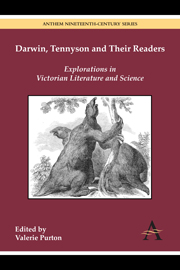Book contents
- Frontmatter
- Contents
- Introduction
- Chapter 1 Tennyson's ‘Locksley Hall’: Progress and Destitution
- Chapter 2 ‘Tennyson's Drift’: Evolution in The Princess
- Chapter 3 History, Materiality and Type in Tennyson's In Memoriam
- Chapter 4 Darwin, Tennyson and the Writing of ‘The Holy Grail’
- Chapter 5 ‘An Undue Simplification’: Tennyson's Evolutionary Afterlife
- Chapter 6 ‘Like a Megatherium Smoking a Cigar’: Darwin's Beagle Fossils in Nineteenth-Century Popular Culture
- Chapter 7 ‘No Such Thing as a Flower […] No Such Thing as a Man’: John Ruskin's Response to Darwin
- Chapter 8 Darwin and the Art of Paradox
- Chapter 9 Systems and Extravagance: Darwin, Meredith, Tennyson
- Chapter 10 T. H. Huxley, Science and Cultural Agency
- Notes on Contributors
Chapter 8 - Darwin and the Art of Paradox
- Frontmatter
- Contents
- Introduction
- Chapter 1 Tennyson's ‘Locksley Hall’: Progress and Destitution
- Chapter 2 ‘Tennyson's Drift’: Evolution in The Princess
- Chapter 3 History, Materiality and Type in Tennyson's In Memoriam
- Chapter 4 Darwin, Tennyson and the Writing of ‘The Holy Grail’
- Chapter 5 ‘An Undue Simplification’: Tennyson's Evolutionary Afterlife
- Chapter 6 ‘Like a Megatherium Smoking a Cigar’: Darwin's Beagle Fossils in Nineteenth-Century Popular Culture
- Chapter 7 ‘No Such Thing as a Flower […] No Such Thing as a Man’: John Ruskin's Response to Darwin
- Chapter 8 Darwin and the Art of Paradox
- Chapter 9 Systems and Extravagance: Darwin, Meredith, Tennyson
- Chapter 10 T. H. Huxley, Science and Cultural Agency
- Notes on Contributors
Summary
Earlier chapters have dealt with Tennyson's ideas and anguish over evolutionary debates in The Princess, with the struggle between progress and destitution in Locksley Hall and with biographical links between Tennyson and Darwin. I want to shift attention in this chapter away from poetry and towards the form and language of prose. I want to celebrate Darwin as a writer whose vision and whose way of handling language had a profound effect on a vast range of literature beyond the poetic, and I want to do so primarily by attending to the element of surprise and paradox in his prose and then looking to some of the less frequently considered aesthetic consequences of taking seriously Darwin's way of looking at the world. The form of Darwin's thought and language can be detected in some unlikely and ostensibly unscientific places, where subjectivity and aesthetic value displace the quest for ‘truth’ and the ‘full look at the worst’ that we usually associate with his enterprise.
To do this I want to attend to Darwin the writer, who is not the dark messenger of disenchantment — ‘the Devil's chaplain’, draining meaning from the world, maddening John Ruskin with his materialist preoccupation with sex, and threatening Tennyson with the abolition of God from the universe. Rather, though he depicts a world of relentless and mindless process, he fills it with variety, wonder and meaning, opens a new (and yes, primarily secular) sense of the richness of life, encourages new ways of imagining and inspires new forms.
- Type
- Chapter
- Information
- Darwin, Tennyson and their ReadersExplorations in Victorian Literature and Science, pp. 109 - 134Publisher: Anthem PressPrint publication year: 2013



